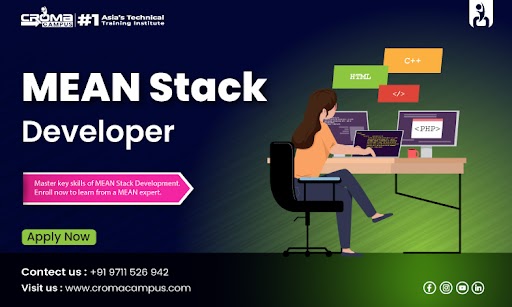Introduction
A MEAN Stack Developer is a professional who specializes in using the MEAN stack to develop web applications. The MEAN stack is a collection of JavaScript-based technologies used to develop web applications. The acronym MEAN stands for MongoDB, Express.js, AngularJS (or Angular), and Node.js. Each of these technologies plays a specific role in the development process, and a MEAN Stack Developer is proficient in using all of them to build robust and scalable web applications.
Skills of a MEAN Stack Developer
- MongoDB: As a MEAN Stack Developer, proficiency in MongoDB is crucial. MongoDB is a NoSQL database that stores and manages data for MEAN stack applications. A solid understanding of MongoDB and how to interact with it using libraries like Mongoose is essential for managing data effectively.
- Express js: Express.js is a vital part of the MEAN stack, serving as a web application framework for Node.js. It provides a robust set of features for building web applications and APIs. A MEAN Stack Developer should be adept in using Express.js to handle routing, middleware, and other aspects of web development.
- AngularJS/Angular: MEAN Stack Developers work with either AngularJS or Angular to build the front end of web applications. AngularJS, maintained by Google, is a powerful JavaScript framework for building dynamic web applications. Angular, the newer version, offers improved features and performance. A MEAN Stack Developer should be comfortable working with either framework to create engaging user interfaces.
- Node js: Node.js is a JavaScript runtime environment that allows developers to run JavaScript code on the server side. MEAN Stack Developers leverage Node.js to build server-side logic and APIs. A strong understanding of Node.js is essential for handling server-side operations effectively.
- JavaScript: Since the MEAN stack is entirely JavaScript-based, a MEAN Stack Developer should have a comprehensive understanding of JavaScript and its core concepts. Proficiency in JavaScript is crucial for developing both front-end and back-end components of web applications.
- HTML/CSS: MEAN Stack Developers should be proficient in HTML and CSS for designing and structuring the user interface of web applications. HTML is used for creating the structure of web pages, while CSS is used for styling and layout.
- Version Control: Proficiency in version control systems like Git is essential for MEAN Stack Developers to collaborate with other developers and manage code efficiently. Version control allows developers to track changes, revert to previous versions, and work collaboratively on projects.
Role of a MEAN Stack Developer
The role of a MEAN Stack Developer is to design, develop, and maintain web applications using the MEAN stack. This includes:
- Developing front-end and back-end components of web applications.
- Designing and implementing user interfaces using AngularJS or Angular.
- Creating and managing databases using MongoDB.
- Writing server-side logic and APIs using Node.js and Express.js.
- Collaborating with other developers, designers, and stakeholders to deliver high-quality web applications.
Salary of a MEAN Stack Developer
The salary for MEAN Stack Developers is dynamic, influenced by factors like geographic location, professional background, and company size. In the United States, the average annual salary for a MEAN Stack Developer ranges from $70,000 to $120,000, reflecting the spectrum of experience and expertise in this field. Entry-level MEAN Stack Developers, typically with less than a year of experience, can anticipate earning between $70,000 and $90,000 annually.
On the other hand, experienced professionals with significant experience and relevant certifications can command salaries upwards of $100,000 to $120,000 per year. These figures underscore the rewarding nature of MEAN Stack development and the potential for financial growth as one progresses in this career path.
Know the future of Mean Stack Developer
The future for MEAN Stack developers is incredibly promising, buoyed by the continuous evolution and expansion of web technologies. In an era where businesses increasingly rely on web applications to engage customers and streamline operations, the demand for skilled MEAN Stack developers is set to soar.
A pivotal trend shaping the future of MEAN Stack development is the widespread adoption of cloud computing and serverless architectures. MEAN Stack developers are uniquely positioned to harness these technologies, creating scalable and efficient web applications that can swiftly adapt to evolving business requirements.
Moreover, there’s a growing emphasis on user experience and interface design in the development landscape. MEAN Stack developers must remain abreast of cutting-edge front-end development trends, such as progressive web apps (PWAs) and single-page applications (SPAs), to deliver captivating and user-friendly interfaces.
Furthermore, the integration of artificial intelligence (AI) and machine learning (ML) into web applications presents exciting prospects for MEAN Stack developers. By incorporating AI and ML functionalities, MEAN Stack developers can enrich the capabilities of their applications, providing users with more personalized and intelligent experiences.
So, the future for MEAN Stack developers shines brightly, offering abundant opportunities for advancement and innovation. As businesses forge ahead with digital transformation initiatives, MEAN Stack developers will be instrumental in crafting the next wave of web applications that drive unparalleled business success.
Conclusion
Well, a MEAN Stack Developer plays a crucial role in the development of modern web applications. With the right skills and experience, a developer holding a legit MEAN Stack Developer Certification can build innovative and scalable web applications that meet the needs of today’s businesses.




